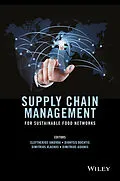An interdisciplinary framework for managing sustainable agrifood supply chains
Supply Chain Management for Sustainable Food Networks provides an up-to-date and interdisciplinary framework for designing and operating sustainable supply chains for agri-food products. Focus is given to decision-making procedures and methodologies enabling policy-makers, managers and practitioners to design and manage effectively sustainable agrifood supply chain networks.
Authored by high profile researchers with global expertise in designing and operating sustainable supply chains in the agri-food industry, this book:
* Features the entire hierarchical decision-making process for managing sustainable agrifood supply chains.
* Covers knowledge-based farming, management of agricultural wastes, sustainability, green supply chain network design, safety, security and traceability, IT in agrifood supply chains, carbon footprint management, quality management, risk management and policy- making.
* Explores green supply chain management, sustainable knowledge-based farming, corporate social responsibility, environmental management and emerging trends in agri-food retail supply chain operations.
* Examines sustainable practices that are unique for agriculture as well as practices that already have been implemented in other industrial sectors such as green logistics and Corporate Social Responsibility (CSR).
Supply Chain Management for Sustainable Food Networks provides a useful resource for researchers, practitioners, policy-makers, regulators and C-level executives that deal with strategic decision-making. Post-graduate students in the field of agriculture sciences, engineering, operations management, logistics and supply chain management will also benefit from this book.
Autorentext
Eleftherios Iakovou, Department of Mechanical Engineering, Aristotle University of Thessaloniki, Greece
Dionysis Bochtis, Department of Engineering, Aarhus University, Denmark
Dimitrios Vlachos, Department of Mechanical Engineering, Aristotle University of Thessaloniki, Greece
Dimitrios Aidonis, Department of Logistics, Technological Educational Institute of Central Macedonia, Greece
Zusammenfassung
An interdisciplinary framework for managing sustainable agrifood supply chains
Supply Chain Management for Sustainable Food Networks provides an up-to-date and interdisciplinary framework for designing and operating sustainable supply chains for agri-food products. Focus is given to decision-making procedures and methodologies enabling policy-makers, managers and practitioners to design and manage effectively sustainable agrifood supply chain networks.
Authored by high profile researchers with global expertise in designing and operating sustainable supply chains in the agri-food industry, this book:
- Features the entire hierarchical decision-making process for managing sustainable agrifood supply chains.
- Covers knowledge-based farming, management of agricultural wastes, sustainability, green supply chain network design, safety, security and traceability, IT in agrifood supply chains, carbon footprint management, quality management, risk management and policy- making.
- Explores green supply chain management, sustainable knowledge-based farming, corporate social responsibility, environmental management and emerging trends in agri-food retail supply chain operations.
- Examines sustainable practices that are unique for agriculture as well as practices that already have been implemented in other industrial sectors such as green logistics and Corporate Social Responsibility (CSR).
Supply Chain Management for Sustainable Food Networks provides a useful resource for researchers, practitioners, policy-makers, regulators and C-level executives that deal with strategic decision-making. Post-graduate students in the field of agriculture sciences, engineering, operations management, logistics and supply chain management will also benefit from this book.
Inhalt
Notes on Contributors ix
Preface xvii
Acknowledgments xxiii
1 Sustainable Agrifood Supply Chain Management 1
1.1 Introduction - Agrifood Supply Chain Management 1
1.2 Why Sustainable Agrifood Supply Chain Management 5
1.3 Hierarchy of Decision-Making for AFSCs 10
1.3.1 Strategic Level 10
1.3.2 Tactical and Operational Levels 17
1.4 Emerging Trends and Technologies in Primary Production 21
1.4.1 Alternative Production Systems 21
1.4.2 Innovative Technologies 23
1.5 Conclusions 25
2 Precision Agriculture: Crop Management for Improved Productivity and Reduced Environmental Impact or Improved Sustainability 41
2.1 Introduction 41
2.2 How Precision Agriculture is Applied 43
2.2.1 Data Collection 43
2.2.2 Data Analysis and Management Zone Delineation 51
2.2.3 Variable Rate Application Technology 52
2.2.4 Auto Guidance Systems and Other Applications 56
2.3 Decision Support Systems for the Farmer 57
2.4 Profitability and Adoption of Precision Farming 57
2.5 Precision Agriculture and Sustainability 59
2.6 Conclusions 60
3 Agricultural Waste Biomass 67
3.1 Introduction 67
3.2 Amount of Biomass 68
3.2.1 Global Production of Agricultural Residues 69
3.2.2 China 76
3.2.3 Denmark 81
3.2.4 USA 83
3.3 Biorefinery Processing of Agricultural Waste Products 86
3.3.1 Physiochemical Properties and Organic Composition of Agricultural Waste and Residue 86
3.3.2 Bioenergy Production 87
3.3.3 Bio?-based Chemical Production 89
3.4 Environmental and Land Use Issues 90
3.4.1 Manure Management 91
3.4.2 Crop Residues Management 95
3.4.3 Land Use Aspects 96
3.4.4 Whole Chain Management 97
3.5 Conclusion 98
4 Maintaining Momentum: Drivers of Environmental and Economic Performance, and Impediments to Sustainability 107
4.1 Introduction 107
4.2 Literature Review 109
4.3 Hypothesis Development 110
4.3.1 The Link between Stakeholder Demands and Integration of Environmental Activities 110
4.3.2 The Link between Integration and Economic and Environmental Performance 111
4.3.3 The Role of Moderating Factors 112
4.4 Data and Method 114
4.4.1 Sample Description 114
4.4.2 Variable Descriptions 115
4.4.3 Statistical Estimation 117
4.5 Results 117
4.6 Discussion and Conclusions 122
5 A Hierarchical Decision?-Making Framework for Quantitative Green Supply Chain Management: A Critical Synthesis of Academic Research Efforts 129
5.1 Introduction 130
5.2 Hierarchy of the Decision?]Making Process 131
5.2.1 Strategic GSCM Decisions 131
5.2.2 Tactical GSCM Decisions 138
5.2.3 Operational GSCM Decisions 142
5.3 Critical Synthesis of Academic Research Efforts 146
5.4 Summary and Conclusions 151
6 Safety and Traceability 159
6.1 Introduction 159
6.2 Drivers for Food Traceability 160
6.3 Traceability: Legislations and Standards 163
6.3.1 International Legislation 163
6.3.2 Standards 166
6.4 Design of Traceability Systems 167
6.4.1 Definitions of Traceability Related Concepts 167
6.4.2 Current Technologies for Traceability 169
6.4.3 Performance Optimization 171
6.5 Future Trends 174
6.6 Conclusions 176
7 Information Technology for Food Supply Chains 183
7.1 Introduction 183
7.2 Information Technology Architecture in a Supply Chain Context 184
7.3 RFID?…
